Related Research Articles

Electricity is the set of physical phenomena associated with the presence and motion of matter that has a property of electric charge. Electricity is related to magnetism, both being part of the phenomenon of electromagnetism, as described by Maxwell's equations. Various common phenomena are related to electricity, including lightning, static electricity, electric heating, electric discharges and many others.

A zero-emission vehicle, or ZEV, is a vehicle that does not emit exhaust gas or other pollutants from the onboard source of power. The California definition also adds that this includes under any and all possible operational modes and conditions. This is because under cold-start conditions for example, internal combustion engines tend to produce the maximum amount of pollutants. In a number of countries and states, transport is cited as the main source of greenhouse gases (GHG) and other pollutants. The desire to reduce this is thus politically strong.

Sweet and Low is a 1914 American silent short drama film starring William Garwood, Harry von Meter, and Vivian Rich, directed by Sydney Ayres, and released by Mutual Film Corporation on October 28, 1914. The film is based upon the 1850 poem Lullaby/Sweet and Low by Alfred, Lord Tennyson.

Albert Edward Coxen was an English-born American actor. He appeared in over 200 films during his career.
Edith Borella was an American silent film actress of Swiss descent. She starred in films such as the 1913 film Through the Neighbor's Window with Charlotte Burton which was her debut. Her career only lasted two years between 1913 and 1915 but in that period of time she starred in 46 films. She married popular English-American actor Edward Coxen in 1914.
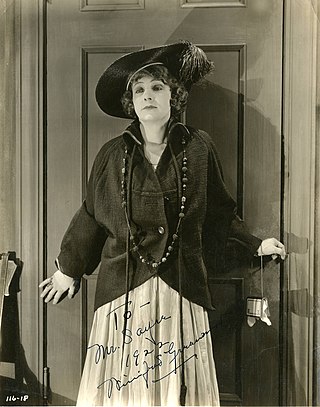
Winifred Louise Greenwood was an American silent film actress.
The Town of Nazareth is a 1914 American silent short drama film starring Ed Coxen, Charlotte Burton, William Bertram, Albert Cavens, Jean Durrell, George Field and Winifred Greenwood. Written by Marc Edmund Jones, the film was released by the American Film Manufacturing Company on March 30, 1914, in two reels.
A Slice of Life is a 1914 American silent short drama film directed by Henry Otto, starring Ed Coxen, Charlotte Burton, and Winifred Greenwood.
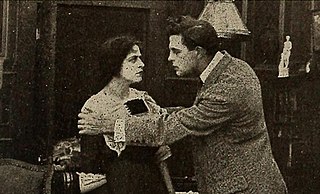
In Tune is a 1914 American silent short drama film directed by Henry Otto starring Charlotte Burton, Ed Coxen, George Field, and Winifred Greenwood.
When a Woman Waits is a 1914 American silent short drama film directed by Henry Otto starring Ed Coxen, George Field, and Winifred Greenwood.
In the Twilight is a 1915 American silent short drama film directed by Tom Ricketts. The film stars Perry Banks, Charlotte Burton, Reaves Eason, David Lythgoe, Louise Lester, Vivian Rich, and Harry Van Meter.

The Restless Spirit is a 1913 American silent short drama film written and directed by Allan Dwan, featuring J. Warren Kerrigan, Lon Chaney, and Pauline Bush. The film is based on Thomas Gray's 1751 poem, Elegy Written in a Country Churchyard, and tells the story of a man who wishes to be a conqueror. A series of illusions follows which show him the futility of conquest when he cannot even conquer his own community.

The Simpsons is an American animated comedy franchise whose eponymous family consists of Homer, Marge, Bart, Lisa, and Maggie. The Simpsons were created by cartoonist Matt Groening for a series of animated shorts that debuted on The Tracey Ullman Show on Fox on April 19, 1987. After a three-season run, the sketch was developed into The Simpsons, a half-hour prime time show that was an early hit for Fox, becoming the first Fox series to land in the Top 30 ratings in a season (1989–1990). The popularity of The Simpsons has made it a billion-dollar merchandising and media franchise. Alongside the television series, the characters of the show have been featured in a variety of media, including books, comic books, a magazine, musical releases, and video games.

Who's Your Neighbor? is a 1917 silent American propaganda and drama film directed by S. Rankin Drew. The film's plot focuses around reformers who pass a law to force prostitutes, including Hattie Fenshaw, out of the red light district. Fenshaw becomes Bryant Harding's mistress and lives in an apartment next door to a reformer, and continues to ply her trade. After Fenshaw becomes familiar with Harding, his son, daughter and the daughter's fiancé, the climax of the film occurs as the cast assembles at Fenshaw's apartment. Harding returns and a fight breaks out that results in the reformers' arrival and concludes with the presumption that Fenshaw returns to a place of "legalized vice". The drama was written by Willard Mack and was his first foray into screen dramas. The film proved controversial, but is noted as a great success. The film originally debuted on June 15, 1917, but it was rejected by the National Board of Review and was later approved after a revision, but the film continued to be labeled as an immoral production. The film is presumed to be lost.
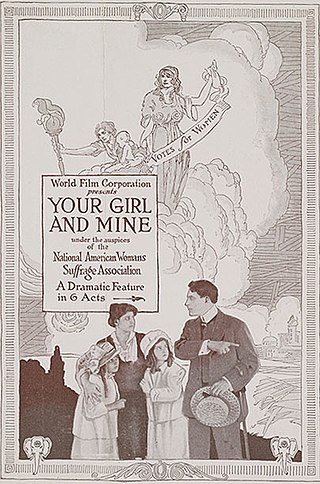
Your Girl and Mine is a 1914 film promoting woman's suffrage. It was sponsored by Ruth Hanna McCormick as well as the National American Woman Suffrage Association NAWSA. It was produced by William Selig and directed by Giles R. Warren. Gilson Willets wrote the script. Motography covered the film. The movie was shot in Chicago, Illinois.
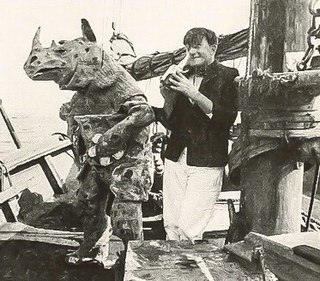
The Ringtailed Rhinoceros is a lost 1915 American silent comedy-drama film that depicted the ruinous effects of alcohol on a good-natured man and on the lives of the people around him. Like snakes and "pink elephants" that have been used in many societies to symbolize heavy drinking or been associated with the hallucinations of drunkards, the main character in this "'photophantasy'" blamed instead a "Ringtailed Rhinoceros" for his excessive use of wine and liquor.
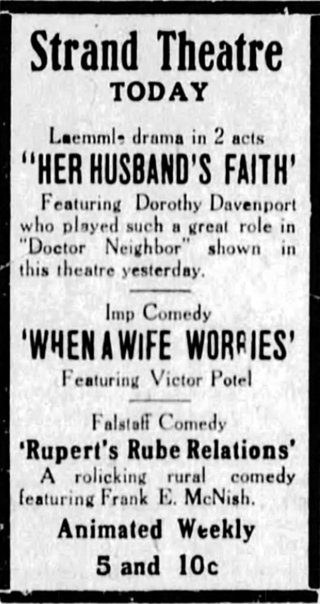
Her Husband's Faith is a 1916 American silent short film directed by Lloyd B. Carleton. The film is based on a story by Paul Machette. Eugene De Rue developed the screenplay. This domestic society drama's features Dorothy Davenport, T. D. Crittenden and Emory Johnson.

On the morning of June 13, 1914, a disastrous fire and a series of related explosions occurred in the main film vault of the Lubin Manufacturing Company in Philadelphia, Pennsylvania. Several possible causes for the blaze were cited at the time, one being "spontaneous combustion" of highly flammable nitrate film, which was the motion picture industry's standard medium for cameras throughout the silent era and for the first two decades of "talking pictures". Millions of feet of film were consumed in the flames, including most of the master negatives and initial prints of Lubin's pre-1914 catalog, several of the company's recently completed theatrical prints ready for release and distribution, a considerable number of films produced by other studios, inventories of raw and stock footage, hundreds of reels documenting historic events that occurred between 1897 and early 1914, as well as other films related to notable political and military figures, innovations in medical science, and professional athletic contests from that period. While this fire was not a decisive factor in Lubin's decline and bankruptcy by September 1916, costs associated with the disaster only added to the corporation's mounting debts, which led to the closure or sale of its remaining operations the following year.

Frances "Frankie" Mann was an American actress, who appeared in over forty silent films between 1913 and 1925.

This is a list of known on-screen appearances made by Joe Martin (orangutan), a film star of the 1910s and 1920s.
References
- ↑ "This Is Th' Life". The Moving Picture World . 1914-08-22. p. 1144 . Retrieved 2023-04-16– via Internet Archive.
- ↑ ""This Is Th' Life"". Reel Life. Vol. 4, no. 2. Mutual Film. 1914-08-15. p. 16 . Retrieved 2023-04-16– via Internet Archive.
- ↑ ""Flying A" Sidelights". Billboard . Vol. 26, no. 33. 1914-08-15. Retrieved 2023-04-16– via Internet Archive.
- ↑ "Electricity Vital to Development. Interesting "Flying A" Subject". Motography . Vol. 12, no. 8. 1914-08-22. pp. 263–264 . Retrieved 2023-04-16– via Internet Archive.
- ↑ ""This Is Th' Life"". Electrical Merchandise and Selling Electricity. Vol. 13, no. 11. November 1914. Retrieved 2023-04-16– via Internet Archive.